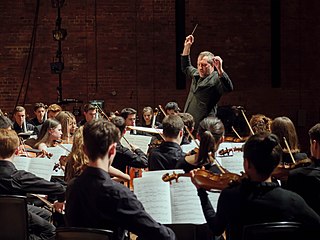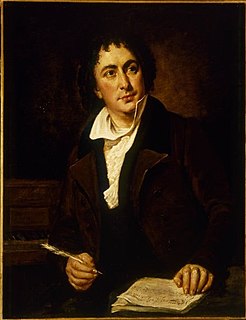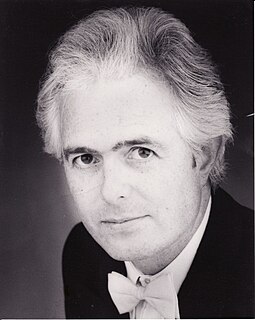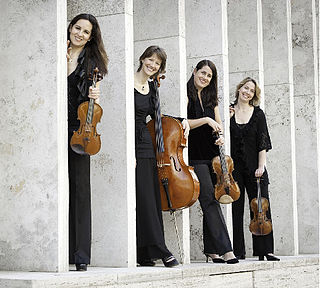
Thomas Adès is a British composer, pianist and conductor. Five compositions by Adès received votes in the 2017 Classic Voice poll of the greatest works of art music since 2000: The Tempest (2004), Violin Concerto (2005), Tevot (2007), In Seven Days (2008), and Polaris (2010).
John Harris Harbison is an American composer, known for his symphonies, operas, and large choral works.
Carl Vine,, is an Australian composer of contemporary classical music. From 1975 he has worked as a freelance pianist and composer with a variety of theatre and dance companies, and ensembles. Vine's catalogue includes eight symphonies, twelve concertos, music for film, television and theatre, electronic music and numerous chamber works. Since 2000 he has been the Artistic Director of Musica Viva Australia. In 2005 he was awarded the Don Banks Music Award. In the 2014 Queen's Birthday Honours List, Vine was appointed as an Officer of the Order of Australia (AO), "for distinguished service to the performing arts as a composer, conductor, academic and artistic director, and to the support and mentoring of emerging performers."
Richard John MillsDMus BA(Hons), is an Australian conductor and composer. He is currently the Artistic Director of Victorian Opera, and formerly Artistic Director of the West Australian Opera and Artistic Consultant with Orchestra Victoria. He was commissioned by the Victoria State Opera to write his opera Summer of the Seventeenth Doll (1996) and by Opera Australia to write the opera Batavia (2001).
The Zephyr Quartet is a string quartet based in Adelaide, South Australia. Founded in 1999, they have been recognised with awards and have collaborated with international musicians.
Matthew John Hindson AM is an Australian composer.

Piers Lane is an Australian classical pianist. His performance career has taken him to more than 40 countries. His concerto repertoire exceeds 75 works.
Peter Wentworth Bucknell is a filmmaker, an author and classical violist residing in Barcelona.
Ernest Victor Llewellyn CBE was an Australian violinist, concertmaster, violist, conductor and musical administrator. He was the founding director of the Canberra School of Music and is commemorated by Llewellyn Hall, the concert venue at the School.
Ian Munro is an Australian pianist, composer, writer and music educator. His career has taken him to over 30 countries in Europe, Asia, North America and Australasia.
Richard Goldner was a Romanian-born, Viennese-trained Australian violist, pedagogue and inventor. He founded Musica Viva Australia in 1945, which became the world's largest entrepreneurial chamber music organisation. The Goldner String Quartet was named in his memory.
The Goldner String Quartet is an Australian string quartet formed in 1995 in honour of Richard Goldner, the founder of Musica Viva Australia.
Patrick Greene is an American composer and performer of contemporary classical music. A lifelong resident of New England, he has been based in Boston, Massachusetts, since 2008.
The New Zealand Chamber Soloists (NZCS), are a New Zealand based chamber music ensemble. The NZCS consists of prominent concerto soloists with national and international careers and extensive chamber music experience. The core of the ensemble is the piano trio consisting of New Zealand pianist, Katherine Austin, American-born cellist, James Tennant and violinist, Lara Hall. Other collaborators have included David Griffiths (composer) and baritone, clarinettist, Peter Scholes and harpsichord specialist, Rachel Griffith-Hughes.
Jorge Grundman Isla is a Spanish classical composer, musicologist, musician and professor who has helped to recover the music of Robert Kahn and Adalbert Gyrowetz among others through the non-profit music foundation created by him.
The Limelight Awards were an annual celebration of the performances, recordings and music personalities in Australian classical music. Sponsored by the monthly classical arts magazine Limelight, they were the only publicly voted awards of their kind in Australia. In 2012 the awards attracted more than 4,500 votes.

The earliest western musical influences in Australia can be traced to two distinct sources: in the first settlements, the large body of convicts, soldiers and sailors who brought the traditional folk music of England, Wales, Scotland and Ireland; and the first free settlers, some of whom had been exposed to the European classical music tradition in their upbringing. An example of original music by a convict would be an 1861 tune dedicated to settler James Gordon by fiddler constable Alexander Laing. Very little music has survived from this early period, although there are samples of music originating from Sydney and Hobart that date back to the early 19th century. Musical publications from this period preserved in Australian libraries include works by Charles Edward Horsley, William Stanley (composer), Isaac Nathan, Charles Sandys Packer, Frederick Augustus Packer, Carl Linger, Francis Hartwell Henslowe, Frederick Ellard, Raimund Pechotsch and Julius Siede.

David Bollard is a New Zealand-born Australian classical pianist and teacher.
Daniel Rojas is a Chilean-born Australian pianist and composer. Rojas' work as a composer and improviser draws upon indigenous, folk, popular and classical Latin American traditions.

The Lark Quartet is a New York-based, all female string quartet founded in 1985. It is acknowledged for its distinguished contribution to the string quartet repertoire, commissioning new works from some of America's most celebrated composers. Most notably, Aaron Jay Kernis' two string quartets: Quartet no. 1 Musica celestis and Quartet no. 2 Musica instrumentalis, which received the Pulitzer Prize in 1998. The Lark Quartet served as Quartet-in-Residence at the University of Massachusetts Amherst from 2004–08 and has recorded numerous albums on multiple labels including Decca/Argo, Arabesque, Bridge, ERI, Endeavor and Koch.




